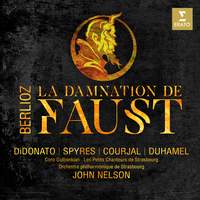Recording of the Week,
La damnation de Faust from John Nelson
With Awards Season (including our own Recordings of the Year deliberations) in full swing, it occurred to me this week what a hard act the American conductor John Nelson had to follow with his Damnation de Faust, released today on Erato - his 2017 live recording of Les Troyens from Strasbourg scooped a formidable number of gongs, but it’s my pleasure to predict a similar success here. With the same orchestral forces on board and Michael Spyres and Joyce DiDonato returning in central roles, this road to hell is paved with far more than mere good intentions.
 A life-long Berlioz devotee, Nelson’s obvious affection for this music is evident from the off in an account which stresses the tenderness and the inner details of the score even in potentially bombastic passages such as the famous Hungarian March. Though this is a modern-instrument performance using relatively large forces, there’s an almost period sensibility to some of the orchestral playing: the vibrato-free strings during Faust’s dream-scene and the rasping brass in passages like the Soldiers’ Chorus put me very much in mind of François-Xavier Roth’s recent contributions to the Berlioz anniversary with Les Siècles.
A life-long Berlioz devotee, Nelson’s obvious affection for this music is evident from the off in an account which stresses the tenderness and the inner details of the score even in potentially bombastic passages such as the famous Hungarian March. Though this is a modern-instrument performance using relatively large forces, there’s an almost period sensibility to some of the orchestral playing: the vibrato-free strings during Faust’s dream-scene and the rasping brass in passages like the Soldiers’ Chorus put me very much in mind of François-Xavier Roth’s recent contributions to the Berlioz anniversary with Les Siècles.
His cast are similarly passionate and idiomatic. Spyres’s astonishing Énee in Les Troyens firmly established him as one of the best ‘French’ tenors around today, and if anything he’s on even better form here, seeming completely inside the character as well as entirely on top of Berlioz’s often excruciatingly demanding writing; the voice has an almost baritonal quality in the middle and lower reaches, so that the first time it flares into life above the stave in his world-weary opening monologue provides a real thrill even if you’re already familiar with his voice and with the score. Faust being a somewhat less heroic figure than the founder of Rome, the role offers more opportunities to hear Spyres in introspective mode, and his immaculate control in the pianissimo upper reaches of ‘Merci, doux crépuscule’ rivals that of Jonas Kaufmann, whose Faust I heard in Paris back in 2016.
 Méphistophélès is French bass Nicolas Courjal, who sang Narbal on Les Troyens and has spent much of the interim harvesting the souls of various Fausts across France – he appears on Roth’s live Damnation from Versailles (released earlier this year), and following various productions of Gounod’s Faust this season now has the title-role of Boito’s Mefistofele in his sights for 2020. This intense immersion in the character pays dividends here in a performance that resists the temptation to play to the gallery and instead emphasises Méphistophélès’s chilling plausibility – rather than the sardonic nihilism which Christopher Purves recently brought to the role, Courjal lures Faust to the dark side with what seems like genuine sympathy, shot through with a subtle but unmistakeable sexual charge. In purely vocal terms, too, it’s a shrewd bit of casting: against the clean, bright, open timbres of Spyres and DiDonato, Courjal’s smokier, slightly recessed sound takes on an other-worldly quality which suits his role as arch-manipulator down to the ground.
Méphistophélès is French bass Nicolas Courjal, who sang Narbal on Les Troyens and has spent much of the interim harvesting the souls of various Fausts across France – he appears on Roth’s live Damnation from Versailles (released earlier this year), and following various productions of Gounod’s Faust this season now has the title-role of Boito’s Mefistofele in his sights for 2020. This intense immersion in the character pays dividends here in a performance that resists the temptation to play to the gallery and instead emphasises Méphistophélès’s chilling plausibility – rather than the sardonic nihilism which Christopher Purves recently brought to the role, Courjal lures Faust to the dark side with what seems like genuine sympathy, shot through with a subtle but unmistakeable sexual charge. In purely vocal terms, too, it’s a shrewd bit of casting: against the clean, bright, open timbres of Spyres and DiDonato, Courjal’s smokier, slightly recessed sound takes on an other-worldly quality which suits his role as arch-manipulator down to the ground.
 The relatively small role of Marguerite doesn’t exploit DiDonato’s emotional range to the same extent as Didon in Les Troyens, but it fits her slim, high-lying mezzo to perfection and like Spyres the French language seems to bring out the very best in her voice. The two of them blend magically in a love-duet that’s more about empathy than eroticism (here again Spyres’s ability to shape and shade at the very top of the voice is a marvel), and it’s easy to see why her quiet, abject agony in the extended aria after Faust abandons her reduced Nelson to tears in the live performances.
The relatively small role of Marguerite doesn’t exploit DiDonato’s emotional range to the same extent as Didon in Les Troyens, but it fits her slim, high-lying mezzo to perfection and like Spyres the French language seems to bring out the very best in her voice. The two of them blend magically in a love-duet that’s more about empathy than eroticism (here again Spyres’s ability to shape and shade at the very top of the voice is a marvel), and it’s easy to see why her quiet, abject agony in the extended aria after Faust abandons her reduced Nelson to tears in the live performances.
As one-hit-wonder Brander, Alexandre Duhamel does a wonderful job of portraying a rambling drunk feigning sobriety in his macabre tavern-song about a roasted rat, but really the fourth star performance comes courtesy of the Coro Gulbenkian, who impersonate soldiers, drunken revellers, will-o’-the-wisps, church-goers and devils with incisive aplomb: they’re particularly arresting in the spiteful, nasal ‘Amens!’ in the parody requiem for Brander’s apocryphal rat, and their diction is crystal-clear throughout.
For me this is the crowning glory of this Berlioz anniversary year - Nelson and Co. should clear some space on the mantelpiece now.
Michael Spyres (Faust), Joyce DiDonato (Marguerite), Nicolas Courjal (Méphistophélès), Alexandre Duhamel (Brander)
Coro Gulbenkian, Strasbourg Philharmonic Orchestra, John Nelson
Available Formats: 2 CDs + DVD Video, MP3, FLAC, Hi-Res FLAC
Joyce DiDonato (Didon), Michael Spyres (Énée), Marie-Nicole Lemieux (Cassandre)
Orchestre et Choeur philharmonique de Strasbourg, Badischer Staatsopernchor, Choeur de l’Opéra du Rhin, John Nelson
Available Formats: MP3, FLAC, Hi-Res FLAC




